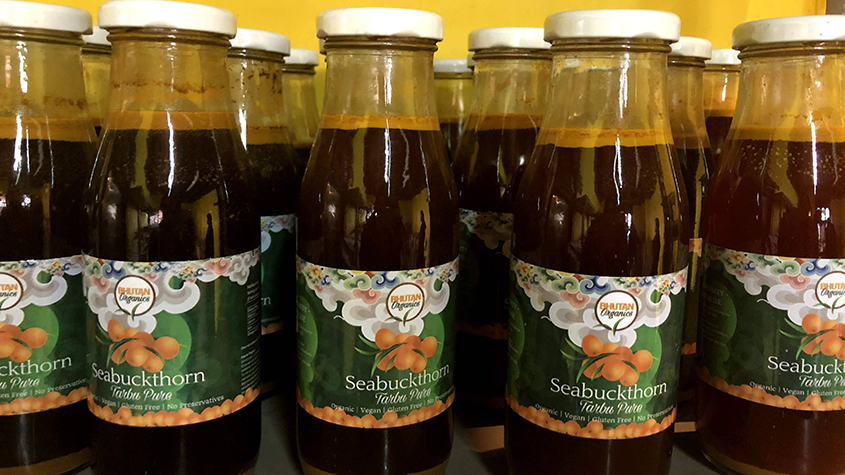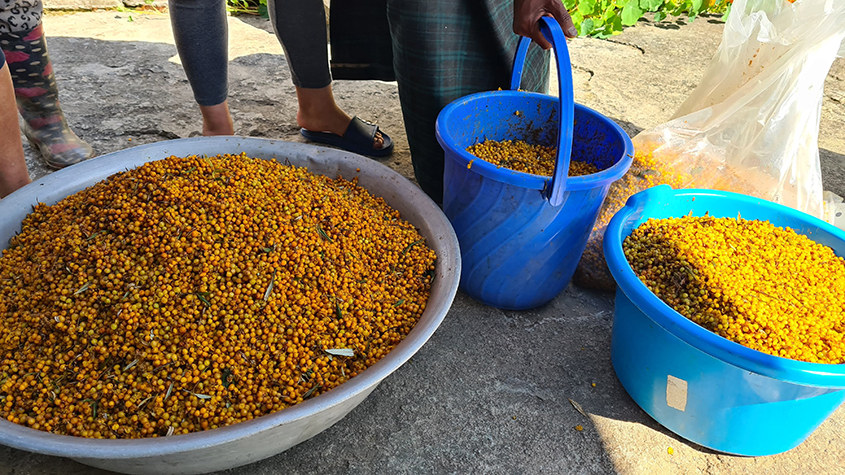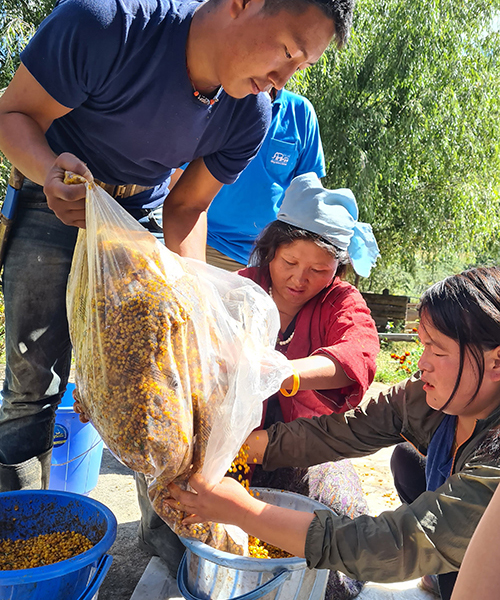“A Small Company Turns Wild Berries into a Business Providing Extra Income for Farmers”
Yeshey Wangmo, Tshering Lham, and Yeshey Tshogay are longtime friends who share a passion for traveling across their country, Bhutan, going on hikes, and meeting people in the countryside. They also always wanted to work together and thought about combining their passion with a meaningful business goal. Six years later, they are co-owners of Bhutan Organics, a small startup commercializing wild sea buckthorn products and herbal teas.
The three friends, now in their forties, come from very different backgrounds. Yeshey Tshogay for example, is an electrical engineer, while one of her two friends is helping her husband run a heavy equipment hiring business, and the other one is a former civil servant and now a homemaker. Yeshey is a businessperson, who had “a few businesses”, started her IT company, and was the first generation entrepreneur in her family.

Sea Buckthorn Berries – a Fruit with Bountiful Health Benefits
Bhutan is known for its natural resources, its rich forests, and the three friends started to explore possibilities, and in particular with sea buckthorn, a wild berry, abundantly available in Bhutan, along riversides. Inquiring into the nutritional benefits of the plant they realized that the berries have the highest vitamin C content (10 times more than oranges), and are an excellent source of omega 3, 6, 7, and 9. “It is such a fantastic plant, and it was getting wasted, as nobody harvested those wild berries,” said Yeshey.
“Our main interest was to engage with the community,” she explained, and when the Bhutanese government initiated small funding for a project involving sea buckthorn syrup, “we applied for the funding.” With no agriculture or medicinal background, “we just jumped into it and tied up with the Institute of indigenous medicine in Bhutan.” Many indigenous medicines contain sea buckthorn for its high content of vitamin C, which helps assimilate the other ingredients by the body, she further explained.
Bhutan Organics’ product range
Sea Buckthorn Syrup, Juice and Powder on the Catalogue
To facilitate the project, the government undertook a mapping exercise to try to evaluate how much sea buckthorn there is in the country. The first mapping revealed a disappointing amount of available plants, but the friends were undeterred, took their loan money, and tried to harvest as many berries as they could in 10 days from the field. They ended up gathering a few thousand kilos of berries and proved that there was enough resource to launch their business.

Their first harvest was promptly converted into syrup, with the help of the institute. Over the years, the company diversified its products, and now offers in addition to syrup, pure juice, squash, ready to drink juice, and sea buckthorn powder, but “what we are really trying to get now, is the oil because it has a high value, both nutritional and cosmetic,” she said. Other products were added to the collection three years ago, including herbal teas and green tea made from sea buckthorn leaves, joined by apple cider vinegar in 2020. The company, which now employs seven people full-time, is working with farmers to harvest wild blueberries to launch a new product line.
Sea buckthorn was mostly being wasted, she said. It is a hardy shrub and people would cut it to make posts for fencing. Now people have seen the value in the plant and they want to grow it in their garden because they know there is a market, Yeshey explained. “This year we saw one lady who grew one tree in her land and was able to collect over 60kg of berries.” “It was so easy for her to collect berries from her garden, give it to us, and earn over US$100, which in rural Bhutan is quite a lot of money.” That will set an example, she said.
Sea Buckthorn harvest – an Additional Income for Farmers in Bhutan
Harvesting the berries in the forest can also provide additional income for farmers, as the harvesting season lasts for one or two weeks in late autumn after the paddy and potato harvesting. The berries are then processed and kept in cold storage.
Currently, there is enough resource in the wild to satisfy the needs of Bhutan Organics as the business has not grown very much since its launch.

Bhutan Organics commercializes its products mainly through its Facebook and Instagram pages and local distributors and shops. Some shops in Singapore and Japan are also purchasing products. “We are trying to penetrate the Indian market, which would make the most sense for us. India has a huge high-end market but we have not been able to get into that market.”
Sea buckthorn products are luxury products but cheap enough for everybody. The berries are all hand-picked from the wild, which is very laborious, from nature which is pristine and free from polluting industries.
Many Challenges to Overcome

Bhutan Organics has to face many challenges the first of which is logistics. Bringing the berries from harvesting sites to the processing unit can prove difficult and very costly. Another challenge is research and development. “Bhutan Organics is a very small business, it has a high impact on the ground, but in terms of profitability, we are just being fed purely by our passion,” she said.
Marketing, certification, and testing are also challenging. There is a need for testing facilities in the country, she noted, suggesting the establishment of a food technology center, much as there are IT parks, offering services such as packaging.
The COVID-19 crisis has shifted mentalities, she said, “as many people in Bhutan have become more entrepreneurial, with many people setting up small businesses both online and offline.” Integrated services to SMEs would be a necessity, and advice on intellectual property protection could be part of those services, as well as marketing, standardization, certification, and testing.
Bhutan Organics to Develop a Branding Strategy based on IP
IP is one of the company’s weakest points, according to Yeshey, where most don’t pay much attention to protecting one’s IP rights. “We are fortunate that, in Bhutan, the government tries to provide some level of protection by not giving any two businesses the same name after it has been registered.” “However, to grow the scale of our company we need a lot of support to establish our branding strategy.”
Very interestingly, Yeshey said, being three women co-owner of Bhutan Organics has turned out to be an advantage since women are very active in the community in Bhutan, we could connect with them more easily.
Providers of Healthy Organic Food locally-sourced in Bhutan
“We would like to see ourselves as recognized providers of healthy foods, a well-respected brand selling to high-end stores around the world, and providing substantial income to farmers.” There is a lot of barren land in Bhutan and sea buckhorn is very easy to grow, “we would like to secure our supply of berries in the future through plantation in partnership with farmers,” Yeshey said.
Source: WIPO